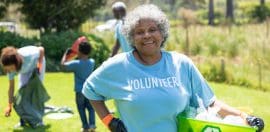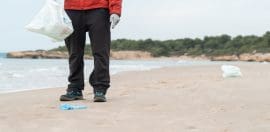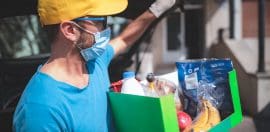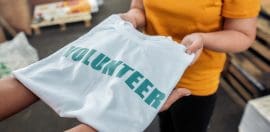Women empowering women: How Australian volunteers are supporting gender equality in Papua New Guinea

2 March 2020 at 8:26 am
International Women’s Day on 8 March provides an opportunity to acknowledge three women who, through the Australian Volunteers Program, are working with organisations to empower women in Papua New Guinea.
Gender equality is an explicit, internationally recognised human right. Yet across the world women are experiencing power – and the abuse of power – in many different ways. Where you live, how much you earn, your sexuality, your race: each determines individual experiences of a global problem.
In Papua New Guinea the challenges facing women are emblematic of those being faced elsewhere, such as low representation in government and business, barriers to education, and sexual and family violence. But there are many organisations challenging existing practices and driving new, more equitable ways forward.
Giving a voice to women market sellers
Up to 85 per cent of women in Papua New Guinea earn their livelihood from the informal economy, mostly selling goods at markets and on the street side. HELP Resources is a local NGO that is helping to give a voice to these women by supporting them to organise and create a dialogue with government and decision-makers.
While the work of women in Papua New Guinea plays an integral role to the wellbeing of families – helping pay for education and healthcare and putting food on the table – as with many countries, women operate in a context of family and structural violence.
“No family, community, society or country can progress when women’s work, and their contribution to the economy and welfare, are ignored,” says Elizabeth Cox, an Australian volunteer and mentor at HELP Resources.
“Papua New Guinea has a constitution, and policies and laws to limit discrimination and oppression. Civil society has an important part to play in implementation – making women’s lives and contributions visible, valuable and safe.”
This is where HELP Resources is stepping in. With their support, more than 600 market and street traders in Wewak have organised the first provincial vendors association.
The members, who are predominantly women, are informing themselves about the constitution and laws to be better able to engage with local leaders, and influence the way the informal economy is planned and developed. They are currently petitioning government to provide functioning toilets, reliable water, better shelter from the tropical weather, and safer spaces.
“This is a significant and brave step forward,” Elizabeth says.
Putting women at the centre of their own health and wellbeing
Women in Papua New Guinea also carry a high burden of disease due to their economic, political and social position.
Low immunisation rates for babies and children are a prime example. When children get sick, it is women who are most impacted, taking up the bulk of the care burden. Papua New Guinea also has high rates of maternal mortality, which has a profound impact on women, families, and communities across the country.
Deb Chapman is volunteering with Touching The Untouchables (TTU), a small, health-focused NGO that supports women, based in Goroka in the scenic highlands.
“Work to support women’s health directly supports greater participation by women in many aspects of life – this work lies at the heart of equity,” Deb says.
TTU are tackling this challenge through public health and community engagement: helping people prevent illness and be less reliant on medicine and health services. The organisation is helping change behaviours around water, sanitation and hygiene (WASH), and runs a comprehensive “Safe Motherhood” program, which trains village health volunteers and community-based health volunteers, who are almost exclusively women.
The empowerment experienced by the village health volunteers is tangible: one program participant was recently elected as a local government councillor in her district.
“In a country with low numbers of women participating in governance this is a very significant achievement, and directly attributable to TTU’s excellent work,” Deb says.
“Putting Papua New Guinean women at the centre of their own lives and needs, accompanied by power and resources, is useful, constructive and sustainable development.”
Empowering women to improve water and sanitation practices
Like Deb, Karen Heyward has supported WASH projects, and recently volunteered with WaterAid in Wewak.
Karen recognised her work to support improved hygiene and sanitation practices was happening in an environment where the right for women to be educated, financially independent, safe, and to have a voice in how the community runs, was not being recognised – by neither men nor women.
The team surveyed WASH facilities through a gender and disability focused lens. It became apparent that women were integral to the improvement of WASH facilities and behaviours, and needed to be involved in the decision-making process.
From the beginning of the project WaterAid formed a committee with women’s representatives from each of the district’s wards, a critical step towards giving women a voice, and the community recognising that they have a say.
“Empowering women is important, and any decisions made without consultation from women representatives are not truly representative of what the community needs,” Karen says.
“There are leaders at all levels who are eager to improve the lives of their communities… it is a good time for capacity building and mentoring because people are wanting change.”
Volunteers have a unique role to play
Sharon Rawlings works with the Australian Volunteers Program, developing partnerships with a range of organisations overseas, many of which are supporting women’s empowerment. She says volunteers are uniquely placed to support gender equality outcomes.
“Volunteers integrate themselves in communities, working alongside local teams, and taking the role of mentors and advisors,” Sharon says.
“They support people and teams to build their own capacity from behind the scenes, instead of running the show.”
The Australian Volunteers Program works from a capacity development approach. This means that volunteers begin their assignments by first understanding the cultural context that their partner organisation works in.
It is this understanding that is critical. It allows learning to be a two-way process, and for volunteers to work in a way that is respectful of local culture; particularly relevant in such a culturally diverse country as Papua New Guinea.
“Because of this, volunteers become part of a community and support the process of change in ways that are responsive to local needs,” says Sharon.
“They also build such deep relationships with colleagues and communities, uniquely placing them to support gender equality outcomes.”
For more information about the Australian Volunteers Program and to discover unique opportunities to volunteer in women’s empowerment, visit australianvolunteers.com.







